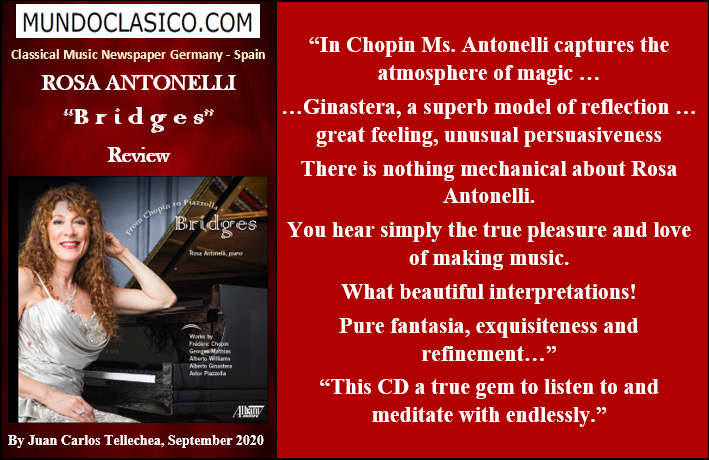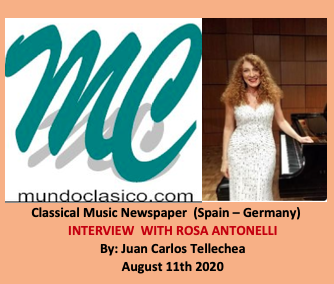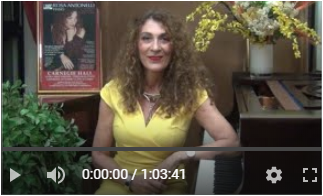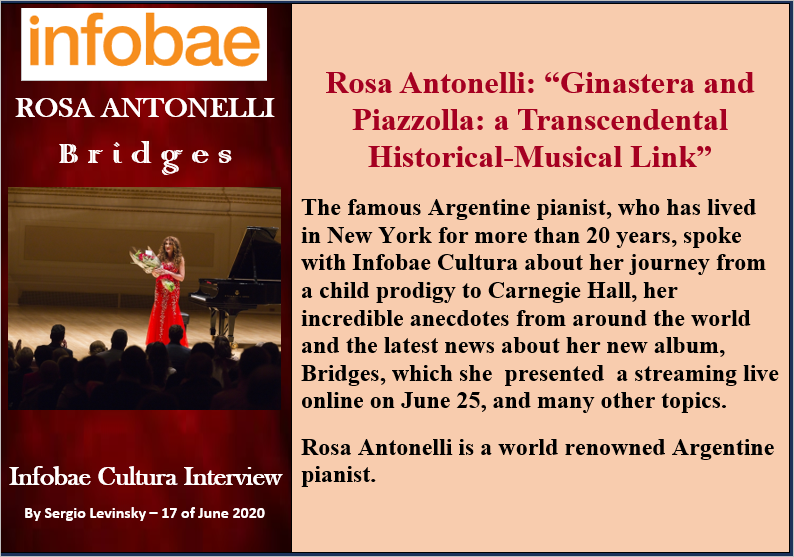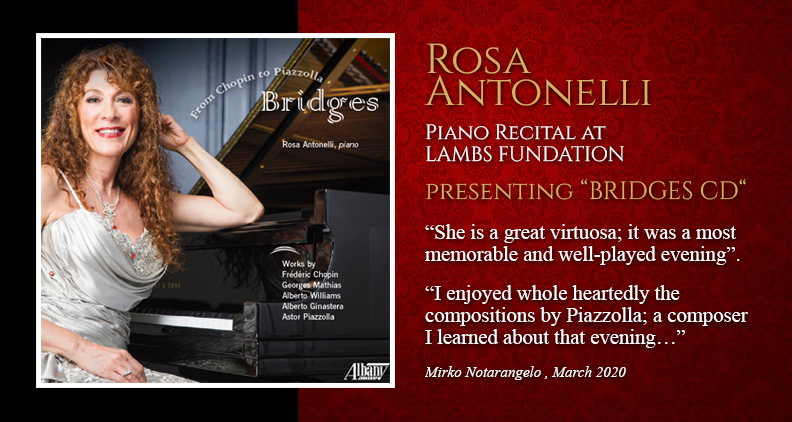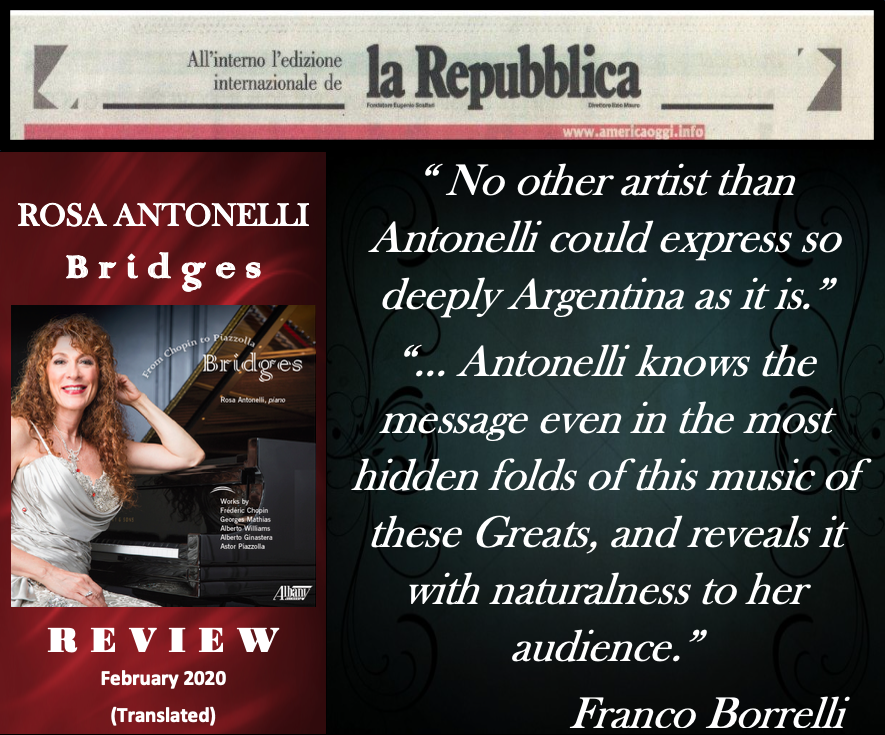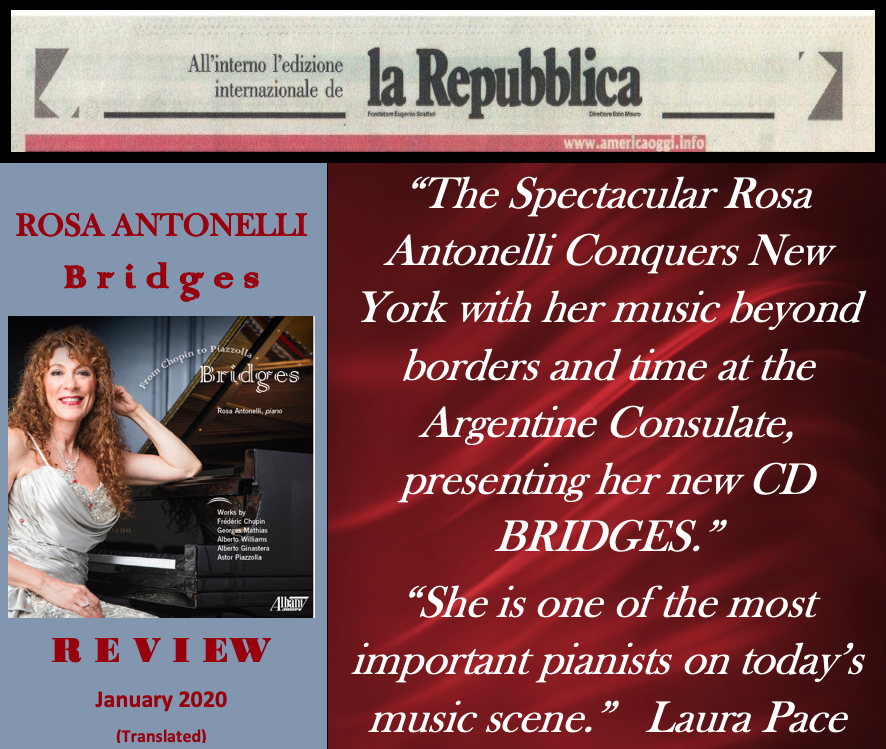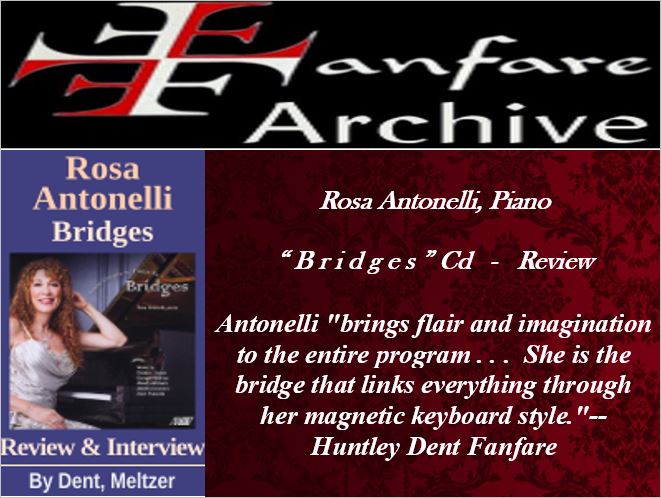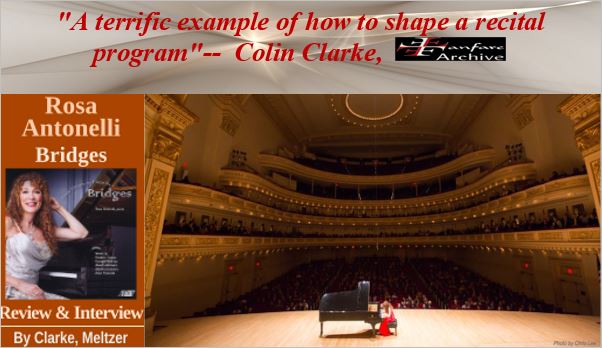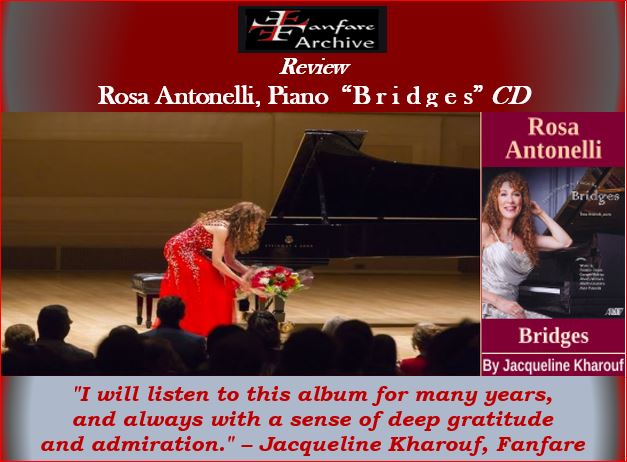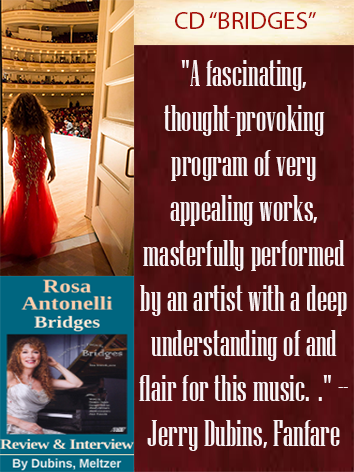REVIEWS – INTERVIEWS
ROSA ANTONELLI – PIANO RECITAL LIVE PERFORMANCE – THE CONSULATE GENERAL OF ARGENTINA IN NEW YORK – AUDITORIUM OCTOBER 27, 2023

__________________________________________________________________________
Rosa Antonelli from Lincoln Center in New York
Review and Interview in Mundo Clasico Web Magazine
For the Spanish version of this interview click the following link (para la version en espaniol de esta entrevista haga click aqui)
https://www.mundoclasico.com/articulo/34683/Rosa-Antonelli-desde-el-Lincoln-Center-de-Nueva-York/
By Juan Carlos Tellechea
Pianist Rosa Antonelli in concert at Lincoln Center in New York, Allen Room Auditorium at Frederick P. Rose Hall. Streaming of the video recording of the live concert presented on Wednesday May 7 2010.
Broadcast on YouTube, Friday March 12 and Wednesday March 31, 2021.
First part of the concert: Ángel Lasala (1914 – 2000), Romancero (Prelude). Carlos Guastavino, two preludes: El patio, El sauce. Alberto Ginastera, Dance of the old cowboy, Dance of the donosa girl. Astor Piazzolla, four tango: Río Sena, Sentido Único, Milonga del Ángel, Chau Paris.
Second part of the concert: Floro Ugarte (1884 – 1975), Prelude to the suite De mi tierra (animated). Isaac Albeniz, L’automne Valse opus 17 (Introduction, I – II – III – Coda. Enrique Granados, Epilogue (Romantic scenes), Allegro de concert opus 46, H. 6.
An avalanche of Latin American and Hispanic influences were presented by the famous and acclaimed pianist Rosa Antonelli during a concert at Lincoln Center in New York on May 7 2010, now broadcast in streaming format to pay heartfelt tribute to the victims of the pandemic around the world and to commemorate the centenary of the birth of the composer Ástor Piazzolla. The recital that took place in the Allen Room of the Frederick P. Rose auditorium of that cultural complex was broadcast in two parts on March 12 and 31, 2021, respectively.
Angel Lasala
The first part started with the presentation and performance of Romancero (Prelude) by the outstanding composer Ángel Eugenio Lasala (1914 – 2000), Antonelli’s teacher at the Carlos López Buchardo National Conservatory of Music, in Buenos Aires.
The affinity that the artist feels with Lasala’s work is undeniable and impressive. With loving dedication, she approached and connected to the keyboard with deep serenity and emotion, putting herself with a creative and inner stage, in direct and immediate spiritual communication with the listener. The pianist takes her time to develop the piece with soft tones in very clear, coherent and solid execution. The music of this composer is remarkably integrated into the Hispanic-American cultural milieu. Someday the complete history of Argentine music of the 20th century will be written and Lasala, with his profile as an authentic creator, will surely occupy a place of honor among the composers of that country.
Carlos Guastavino
Romancero was a good introduction to the concert, which continued with two of the three preludes to La siesta, by Carlos Guastavino, someone better known abroad than Lasala, thanks to the tireless work of dissemination by many Argentine artists, among them not a few exiles,, in Europe and the United States. El patio resounds, in the delicate fingering of Antonelli, with the endearing melancholy that levitates over the rural landscape of Santa Fe, the composer’s native province, and El sauce provides another seductive, bucolic image next to a stream in that same setting or perhaps in some secluded backwater of the Paraná River. Like a gaucho of classical music, Guastavino knows how to connect this genre with folk music, which the pianist captures with a dazzling, enchanting charm.
Alberto Ginastera
With Alberto Ginastera, also much better known outside his homeland and also thanks to exiles, we finally entered the Pampa, guided by the skillful hands of Rosa Antonelli, with two of his three Argentine Dances opus 2 (1937): the Dance of the old cowherd boy, with his strong footwork, the anteroom of the malambo, and the Dance of the Moza, with Donosa entering, like the sweet spirit of a young country woman. Ginastera would remain faithful until his death (in Geneva / Switzerland) to the Argentine folk heritage (and even pre-Columbian), with its chacareras, carnavalitos and malambos wrapped in a modern musical language and firm stylistic continuity.
Astor Piazzolla
The centenary of Ástor Piazzolla, Ginastera’s student, is celebrated by Antonelli with four of his tangos. In two of them, Sena and Chau Paris, she expresses with stunning sensitivity and romanticism the nostalgia and sadness of the bandoneonist and composer after leaving the City of Light, where he loved to live. Those were the times when Piazzolla decisively expanded his training with the teacher of great masters, Nadia Boulanger.
Each of the pianist’s fingers seems to have a brain of its own when she interprets the speed and fever of Sense Unique, wandering excitedly around the big city, like the people that circulated along Broadway behind the huge windows of the room where Antonelli offered this concert, before moving on to the sensual and loving Milonga del Ángel, with its copious sentimentality. There is no doubt that Piazzolla and his master Ginastera physically left this life too early, but their genuine legacies endure through time.
Floro ugarte
With the music of Floro Ugarte, Rosa Antonelli opens the second part of the concert from Lincoln Center. The Prelude (dedicated to the weeping willow), from the suite De mi tierra (1923/1934) by this composer who was close to Argentine nationalism and who studied in Paris at the beginning of the 20th century with Albert Lavignac, Émil Louis Fortuné Pessard and Félix Fourdrain, follows the directions of European modernity that attracted everyone back then. And that’s how current it still sounds to our ears today with its universal character. Antonelli’s punctiliousness as well as precise fingering on the keyboard thrills. Folklore very subtly sneaks into the piece that already denotes the awareness of Ugarte’s creative individuality.
Isaac Albeniz
The inspiring L’automne – Valse (Introduction, I – II – III – Coda), by Isaac Albéniz is performed by Antonelli with prodigious concentration; almost without pauses between the different sections and taking great care with the contrasts, between pianísimos and fortes in the masterful flow of this haunting and memorable music. It is a rich evocation of the time (1889/1890) in which the international prestige of this Spanish pianist and composer grew day by day in Paris and when he was about to move to England, where his work would achieve immediate success shortly after arriving.
Enrique Granados
Antonelli displays an extraordinary purely romantic virtuosity with a more intimate and dreamy Enrique Granados in Epilogue, from Escenas romanticas (1906), and in the glorious Allegro de concert opus 46, H. 6 (1904), full of rich harmonies and brilliant, virtuosic rhythms and passage, rarely touched for its technical difficulty.
The symbolism of the pieces is extremely surprising, especialy given that they are performed no less than a few meters from the current home of The Metropolitan Opera, where the Spanish composer was acclaimed for the last time, after the premiere of his opera Goyescas, on January 26, 1916. and for the Interlude he wrote there, his last composition, a few days before raising the curtain.
Encores: Alberto Williams and Frédéric Chopin
The Argentine pianist undertakes the works with great dedication and concludes the concert with effusive ovations before delivering two encores to the moved audience: the touching Children’s Song opus 13 number 1 by Alberto Williams, and the evanescent, distant, romantic Nocturno number 20 in C sharp minor posthumous opus by Frédéric Chopin. An extraordinary evening. Congratulations Rosa Antonelli!
In the foyer
After the concert, we exchanged email with Rosa Antonelli, as if we had done it in the Lincoln Center lobby, as if we had met personally after the recital, and we asked her about putting together the program. These are her exclusive comments for www.mundoclasico.com:
Juan Carlos Tellechea: What feelings have inspired you, musically and spiritually speaking, the themes and pieces you have chosen, the order in which you have arranged them, the preparations you made, and the performance you presented at Lincoln Center?
Rosa Antonelli: I felt very excited preparing the program for this very special concert as I still had in my memories and in my heart the response of the public when I presented my CD “Esperanza Sounds of Hope”, SONIDOS DE ESPERANZA on the Albany Records label.
I deeply visualized that this would be the perfect repertoire for the concert planned at Lincoln Center, with the addition of three of my favorite works by Albeniz and Granados that I worked on when I received a grant from the government of Spain to specialize in the interpretation of Spanish music and for which I was given the Rosa Sabater Award.
The history
I would like to share the story of this CD so that you understand more of its music and message. The CD was at the request of Albany Records: to record an album with a repertoire and program different from the traditional European ones. So I decided to record Latin American classical composers, in this case classics from Argentina, including Astor Piazzolla. The CD launch was at Barnes & Noble in the Lincoln Triangle in New York, across from Lincoln Center.
Many of the works were world premieres or New York premieres, and I was very concerned as to whether the public would respond positively when they heard works that they had never had access to before; therefore, they did not know them and would not have any reference.
My great surprise that day was that of the CD sales, especially when people after buying them came to ask for my autograph. They said to me: please, the next time I play this program or these composers I want to be informed, because I am passionate about them.
Music that goes deep
My eyes filled with tears and excitement. The next day they called from Barnes and Noble to tell me that I should go autograph a lot more CDs, as people had ordered even more over the phone. I knew then that this music was very special, as it had reached and touched the audience very deeply.
The title of the CD is strongly connected with the common history of all the composers recorded on this album; all were descendants of immigrants. Through the years many people from all over the world, especially from Europe, traveled to Buenos Aires, Argentina, to establish his new home there, many escaping from the terrifying idea of a third World War.
The emigration
They all had a common feeling of nostalgia and melancholy, because they left their relatives and loved ones in their homeland, far away. As it happened with my own family that emigrated from Italy. But at the same time they all also had another feeling in common that drove them: hope. Hope for a better life, hope in a new beginning, hope in a new home, a new light, and the dream of a reunion with loved ones.
In addition, all of them also traveled to follow their dreams in their professions and grow before returning to their countries of origin with a very important new language, European, which they linked to folklore, to the roots of their country, creating a new message. This is a language (the Classic Latino American) that needs to be known, since it is newer than the traditional European one. Hence, it has become my mission to promote these composers through concerts and recordings for the last 10 years, with the help of messages from heaven and my angels!
Some of the composers in this program were my teachers at the Carlos López Buchardo National Conservatory where I studied in my teens. When I won a scholarship from the Spanish government to participate in the International Seminar of Spanish Music, although I already loved playing Albéniz and Granados, my passion was to know much more about their music, so that I was constantly looking for pianos to practice longer, and to play this music as much as possible.
Piazzolla was not my teacher at the Conservatory, but he left a very important mark and message in my personal and artistic life. When I was little and then a teenager, despite the fact that at home they listened to tangos on the radio or on records, many by Carlos Gardel, I felt something stronger that I could not express. I loved classical music and that was what I could play on the piano.
Sometime later I met Piazzolla briefly in a talk he gave to relate the history of tango and its meaning for the people of Buenos Aires, including the nostalgia of the immigrant, who leaves his country in search of something new.
This is how immigrants, particularly Italians, met in cafes to share nostalgia, melancholy, but at the same time hope. The “cafe“ was the home they left behind and they spent hours sharing those nostalgic feelings, but also the hope of a new home. There, I believe, the passion and drama of tango was born, as well as other musical forms of expression.
There I realized that I, the daughter of Italian immigrants like Piazzolla, had that feeling of sadness and melancholy like a stamp printed on my soul, and I was not aware of it or did not want to see it that way. Here in the United States I am also an immigrant, just like my ancestors in Argentina.
When I realized this, I began to play and record tangos by Piazzolla and I was able to put in the notes those feelings, that passion for life, the hope for a better world that, paradoxically, is what we feel at this moment. HOPE FOR A BETTER WORLD, WITHOUT FEARS!
Keep hope
All these composers from their childhood breathed these emotions and feelings and transferred them to their music. At that moment, immediately after the recording, I shared with Albany Records that idea of hope that always accompanied me permanently, that was holding my hand, and that I believed that the world needs more than ever to.
I expressed then, to the record Label that my wish, my dream with this CD was to inspire hope with sounds from my heart and to share it with the world. All these memories came to my mind and soul to prepare the program for my concert at Lincoln Center.
After a year of suffering the outbursts caused by the pandemic, I thought it would be wonderful to share this concert that already had hope impregnated in its sounds and in my heart and that has such an important validity and message in this moment in which we were all separated, separated with sadness, melancholy, with pain.
These reasons led me to dedicate the webcasts of both parts of this particular concert to lost lives, to the centenary of the birthdate of Piazzolla and, as a woman, to International Women’s Day. I also dedicated this recital to all the women who fought for their ideals and dreams and managed to change the world; but I also consecrate it to all those women who fought and were not recognized. Now, in March 2021, one year after the start of the pandemic, we are hopeful that vaccines will be accessible to all to fight and eradicate the virus.
But I also deeply feel that we arrived here at this “now” accompanied by a feeling that never left us and should never abandon us, the strength of hope, for a new beginning, without fear, for a world united by love, security, prosperity, equity, justice and peace; because without justice there is no peace.
JCT: Thank you very much, Rosa Antonelli, for such emotional words.
 Interview with “Pasion Argentina USA” Magazine – By Ruben Gonzalez
Interview with “Pasion Argentina USA” Magazine – By Ruben Gonzalez
PASSIONATE CHARACTERS: ROSA ANTONELLI
Rosa is a respected Argentine pianist with a long career, which has led her to travel the world with her music. A Steinway artist since 1988, she has performed more than a thousand concerts and performances throughout Europe, Asia, Africa, Latin America, and North America. She has given recitals as a soloist, and performed with orchestras and chamber ensembles in countless countries. She has lived in New York City since 2000, and in 2006, was granted American citizenship due to her status as an “Extraordinary Artist”.
Many awards have honored her long and successful career. In 2013 she wrote the book “Piano: The Spirit of Technique and Interpretation for Teachers and Students”, published by Amazon. She has made numerous recordings since her arrival in New York, the latest of which is Bridges, From Chopin to Piazzolla (Albany Records, Troy 1783), which he is recreating these days in her recital presentations.
The most famous concert halls worldwide have hosted her performances, such as Palazzo Visconti, Milano, Augustinum Teatre, Bonn, Glinka Museum, Moscow, Bösendorfer Hall, Vienna, Lincoln Center and Carnegie Hall in New York, among many others.
Rosa, beyond having a unique artistic talent, has the sweet humility of the really great, so she agrees to tell us a little about her personal life. Born in Castelar, Province of Buenos Aires, her memory keeps alive her neighbors, Elsita, Mario, Luis, Adriana and Norma, with whom, thanks to the internet, she maintains contact. These memories also include her school Tomas Espora, three blocks from her house, and her piano teacher Maria Luisa, who encouraged her dreams in the back room of her residence where she had an upright piano, which, thanks to her generosity, Rosa could use long hours of the day. The teacher called Rosa “the light of the backyard” since she was practicing till late hours at night!
Rosa’s mother was named Angelina and her father Enrico, and they were Italian immigrants. Her grandparents Antonio and Delicia lived next door, and there she enjoyed the happiness of hearing Antonio playing the harmonica. Enrico had participated in the First World War, and had traveled alone to Argentina some years before, to begin to build a home there, far from the horror of war and to prepare for the subsequent arrival of his family. Angelina was an opera singer and actress in Italy with a bright future. She started from a young age, but the war came, frustrating all her dreams. She had a trunk where she kept the costumes from her performances in Italy. Rosa tried them on (they fit her very well) and she was happy because they explained the characters her mother played. She also remembers that some Sundays her mother would get together with a fellow Italian, to review the librettos that they had performed in the distant homeland. Rosa’s husband is named Robert, who is a dentist, loves music and is her first admirer.
Rosa María Antonelli is her full name, but for her artistic profile she simplified it to Rosa Antonelli. Her artistic vocation was born in kindergarten, when she heard a music teacher perform popular songs for children. Her mother started looking for a piano teacher and found María Luisa Carfi, of the Grassi Conservatory, who told her mother that she was a prodigy, and told Rosa later on that she never saw a mother like hers who supported her so much. She bought her own upright piano at age 15, and worked hard to pay for it in installments, but she, her talent, and her discipline did the rest, making her the celebrity we are now fortunate to enjoy. Rosa’s days are intense: while she has breakfast she listens to classical music, checks her mail, talks with her assistant and publicist, organizes and reviews her research, concerts, projects, reports, etc., then sits down to practice until 2 in the afternoon, after which she organizes her classes with her students via Zoom or Skype. Rosa loves to dance and is a folklore teacher, and loves all rhythms of dance.
The pandemic has affected her work rhythm, but it helped her to reconnect with the small but great wonders of life that sometimes we put aside due to the busyness of life itself: prepare a good dinner, clean the house, find works by great masters that have never been played. She also understood that she had to adapt to changes and on the internet she found the way to keep in touch with her audience, with her students, and to continue to spread her talent. Recently,she graced the Argentine Consulate with a web recital presentation, where she delighted us with her latest album Bridges, from Chopin to Piazzolla. It is certainly a concert not to be missed, and can be seen at https://www.youtube.com/watch?v=FlE7cbJc-kk&t=180s
IN SPANISH (EN ESPAÑOL)
PERSONAJES PASIONALES:
ROSA ANTONELLI
Es una pianista argentina consagrada, con una amplia trayectoria, que la ha llevado a recorrer el mundo con su música. Artista Steinway desde 1988, ha realizado más de mil conciertos y presentaciones por Europa, Asia, África, Latinoamérica y Norteamérica. Ha brindado recitales como solista, con orquesta y música de cámara en innumerables países, vive en la Ciudad de Nueva York, desde el año 2000, en el 2006 se le ha otorgado la ciudadanía americana, por su estatus de “Artista Extraordinaria”.
Incontables premios han galardonado su extensa y exitosa carrera, ha escrito en el 2013 el libro “Piano: The SPIRIT of Technique and Interpetracion for Teachers and Students”, publicado por Amazon. Numerosos álbumes discográficos ha realizado desde su llegada a Nueva York, el último es Bridges, From Chopin to Piazzola, que está recreando por estos días en sus presentaciones.
Las salas más famosas de conciertos a nivel mundial han albergado su música, como el Palazzo Visconti, Milano, Augustinum Teathre, Bonn, Glinka Museum, Moscú, Bösendorfer Hall, Viena, Lincoln Center y Carnegie Hall de Nueva York, entre muchos más.
Pero Rosa más allá de poseer un talento artístico único, tiene la dulce humildad de los realmente grandes, de tal forma accede a contarnos un poco de su vida personal. Nacida en Castelar, Provincia de Buenos Aires, su memoria mantiene vivo el recuerdo de sus vecinos, Elsita, Mario, Luis, Adriana y Norma, con algunos gracias al internet mantiene contactos, a su añorada escuela Tomas Espora a tres cuadras de su casa, a su profesora de piano Maria Luisa, quién albergaba sus sueños, en el cuarto del fondo de su residencia donde tenía un piano vertical, que gracias a su generosidad podía usar largas horas del día.
Su mamá se llamaba Angelina y su papá Enrico, inmigrantes italianos, al lado de su casa vivían sus abuelos Antonio y Delicia, allí disfrutaba la felicidad de escucharlo tocar la armónica a Antonio, quién había participado en la primera guerra mundial, y había viajado solo a la Argentina algunos años antes, para empezar a construir un hogar allí, lejos del horror de las guerras y preparar la llegada posterior de la familia. Su mamá era cantante de ópera y actriz en Italia con un futuro brillante, empezó desde jovencita, pero la guerra llegó frustrando todos sus sueños, tenía un baúl donde guardaba los trajes de sus actuaciones en Italia, Rosa, se los probaba y aunque le quedaban grandísimos, ella era feliz porque le explicaba los personajes que interpretaba, recuerda también que algunos domingos su mamá se juntaba con una compañera también italiana, para repasar los libretos que habían representado en la lejana patria. El esposo de Rosa se llama Robert, es dentista y ama la música y es su primer admirador.
Rosa María Antonelli es su nombre completo, pero para su perfil artístico los simplificó como Rosa Antonelli. Su vocación artística nace desde el jardín de infantes, cuando escuchó a una profesora de música interpretar canciones populares para niños. Su madre empezó a buscar una profesora de piano y encontró a María Luisa Carfi, perteneciente al Conservatorio Grassi, ella le dijo a su mamá que era un prodigio, y a ella que nunca vio una mamá como la mía, que la apoyaba tanto, ella le compró a los 15 años su propio piano vertical, y trabajó duro para poder pagarlo en cuotas, pero ella, su talento y su disciplina hicieron el resto, convirtiéndola en la celebridad que ahora tenemos la suerte de disfrutar. Los días de Rosa son intensos, mientras desayuna escucha música clásica, chequea su correo, habla con su asistente y publicista, organiza, revisa sus investigaciones, conciertos, proyectos, reportajes etc., luego se sienta a practicar hasta las 2 de la tarde, luego organiza sus clases con sus alumnos por Zoom o Skype. Rosa ama bailar, es profesora de folklore, aunque ama todos los ritmos.
La pandemia también afecto su ritmo de trabajo, pero le sirvió para reencontrarse con las pequeñas grandes maravillas de la vida que a veces dejamos de lado por el vértigo de la vida misma, preparar una buena cena, limpiar con sus manos la casa donde habita, encontrar obras de grandes maestros que nunca habían sido tocadas, también entendió que debía adaptarse a los cambios y en la internet encontró el camino para mantener el contacto con su público, con sus alumnos, y seguir difundiendo su talento. En estos días engalanará el Consulado Argentino con una presentación vía web, donde nos deleitará con su último trabajo discográfico Bridges, from Chopin to Piazzolla. Sin duda será un concierto imperdible y se lo puede mirar en Youtube en este link.
“B R I D G E S between Paris and Buenos Aires”
Juan Carlos Tellechea
Wednesday, September 9, 2020
Passion burns deep and is always at an intimate boil in the intense performances of the 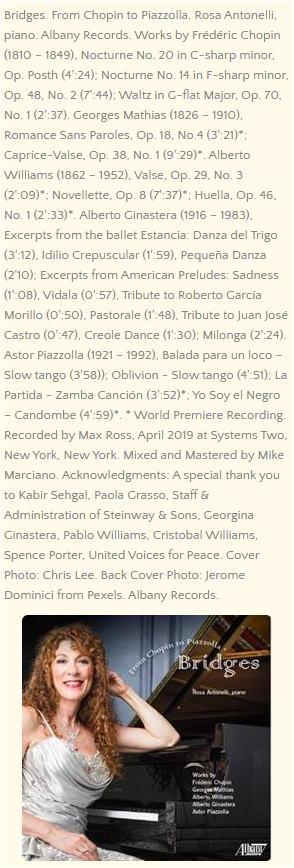 Argentine pianist Rosa Antonelli. She has been based in New York for more than two decades and has been a celebrated Steinway & Sons Artist since 1998. Just seeing her in the concert she gave at (delete the) the Carnegie Hall, that (delete it) was recently broadcast via the internet, you are imbued with that firm, clear, precise, visionary, and rigorous touch that distinguishes her playing.
Argentine pianist Rosa Antonelli. She has been based in New York for more than two decades and has been a celebrated Steinway & Sons Artist since 1998. Just seeing her in the concert she gave at (delete the) the Carnegie Hall, that (delete it) was recently broadcast via the internet, you are imbued with that firm, clear, precise, visionary, and rigorous touch that distinguishes her playing.
The compositions that Antonelli includes on her fourth compact disc for the Albany label, Bridges, enchant the listener with the sweetness of that evanescent, distant, (delete immaterial) and romantic sound of Frédéric Chopin. His music is (suggest different and outside of) everyday and earthly feelings and Ms. Antonelli captures this sentiment perfectly. She creates the same atmosphere of magic with the Romance Sans Paroles and the Caprice Waltz by Chopin’s disciple, the Frenchman Georges Mathias, who was almost totally unknown, ignored or forgotten in Europe. This is the first CD in a series that aims to promote and expand the works by Latin American classical composers and their connections with European creators.
The result of the extensive research carried out by Antonelli are seven compositions that have their World Premiere here (out of a total of 22 tracks), and have been recorded for the first time in the history of music. We are confident that the prestigious American label [Albany] and its director and inspiration, Susan Bush, are pleased and proud of this vital contribution to international musicology.
In addition to the compositions mentioned, there are World Premieres of Valse Opus 29, number 3, as well as the Novellette Opus 8 and the Huella Opus 46 number 1 by Argentina’s Alberto Williams, a student of Mathias (and César Franck) in Paris. And it was in Williams’ Buenos Aires conservatory that Alberto Ginastera studied with him and formed his (add own) style. Ginastera, in turn, would later be the teacher of Astor Piazzolla, whose birth 100 years ago (in Mar del Plata) will be celebrated on March 11, 2021 with concerts and more recordings, surely throughout the world.
For the first time, two pieces composed by Piazzolla, in their piano versions and very little known, have been recorded by (delete the hand of) Antonelli: the Zamba Cancion, La Partida, and the Candombe Yo Soy el Negro, written and published in 1954 and 1956, respectively. Piazzolla was a revolutionary composer who transformed the original tango music of Buenos Aires, and who was frequently criticized in his own country by the staunch defenders of traditional tango. Shortly before this, Piazzolla had returned from Paris, where he had taken classes with the legendary Nadia Boulanger.
The summit of expressiveness is Estancia, Ginastera’s famous ballet suite, in which Antonelli creates a superb model of reflection in the tone of the piece, with great feeling, transparency and intensity, concentration and unusual persuasiveness, with beautiful and lightning arpeggios in some of her passages. Absolutely brilliant! In all four of the 12 American Preludes she chose, Antonelli at times enhances the agitation and instability, and her performance becomes somewhat more vigorous and luxurious (Creole Dance). But the Milonga brings us back to those endearing cadences of the Rio de la Plata territory.
Antonelli alternates vehemence and calm in her interpretations, and after the tranquility, she can go back and add a visionary touch with formidable rigor in the high notes, trills, powerful chords, and sweeping symphonic sound. The Steinway Grand piano sounds perfect and the microphones in the Manhattan studio where this album was recorded in April 2019 were placed with great balance.
The bouquet, the elements of which this generous pianist presents with dexterous and agile hands, blossoms at the end with Piazzolla’s enterprising and melancholic Zamba, an unusual foray into folklore, followed immediately afterward with her irresistible immersion in the Afro-Uruguayan Candombe.
Both songs are preceded by Balada Para un Loco. Though an instrumental version, you can almost hear through Ms. Antonelli’s interpretation the lyricist Horacio Ferrer reciting, and expressing pain through the AA bandoneon; and Oblivion, which does not need verses to reach the soul. There is nothing mechanical about Rosa Antonelli. You hear simply the true pleasure and love of making music. What beautiful interpretations! Pure fantasia, exquisiteness and refinement. This CD a true gem to listen to and meditate with endlessly.
MUNDOCLASICO.COM
INTERVIEW WITH ROSA ANTONELLI
“The only thing left for us is to pray”
By: Juan Carlos Tellechea
INTRODUCTION WRITTEN BY JUAN CARLOS TELLECHEA:
Things are going from bad to worse in the United States, with or without the Chinese video platform. The Donald Trump administration is demagogically focused on continuing in power beyond the presidential elections on November 3 and seeks all kinds of actions to pretend that it assumes responsibilities in the midst of the multiple catastrophes caused by the pandemic. The poorest, the most vulnerable, and the most helpless suffer. American cities, in terms of misery, are not lagging behind that faced by many of the battered cities of the Third World.
Artists, powerless to change or at least contain this situation, enliven their ideas. In this new series of interviews with women dedicated to the arts that we begin here, we begin with the outstanding Argentine pianist Rosa Antonelli, based in New York for more than 20 years. Rosa Antonelli has just released a new compact disc, titled Bridges, in which she builds bridges between Latin American and European composers, and has offered a concert at Carnegie Hall, now broadcasted on the internet. These are her exclusive statements for www.mundoclasico.com:
INTERVIEW WITH ROSA ANTONELLI:
Juan Carlos Tellechea: What reflections does this stoppage of cultural activities in general and musical activities in particular inspire you with respect to the coronavirus?
Rosa Antonelli: Well, this is a profound question; my first reflections I contemplated and expanded on as soon as the pandemic began; as a human being and as an artist, some thoughts and feelings immediately come to mind.
Memories came to mind of my mother, Angelina, who when she was very little was in Italy during the Second World War. Just a week before she suddenly passed away in February of 1992, when no one expected it, she told me about the horrible situations that she had to live through at that young age and all that her parents had to do to protect her and her siblings and other little ones.
They had a house in Rome where my grandfather was a very important architect, but they lived permanently in Sant ‘Agapito, Campobasso Province, in Abruzzo. [very close to there an hour?] Very significant events would unfold in the mid-1920 in what finally became the tragic story of fascism and Benito Mussolini in Italy. My mother, being so small, lived at the moment of the bloody battle of Monte Cassino and together with her parents had to hide in the mountains to protect herself. Of course, in addition to all the other devastations, they also lost everything!
I said to myself: well this, the virus situation, is better if I compare it with that situation of the brutal war. You have to work with your mind and handle the fear that paralyzes you, darkens you. You have to realize that you don’t have to let it in; because fear is the worst enemy of the human being. Then I thought about the many times I heard the phrase, “what matters is today, not yesterday or tomorrow” and it made more sense to me. Now I try to live it intensely in my most intimate fibers since I understood it better. Instead of the pain, the fear, you see the love of life. My other reflection was about what one leaves behind when one leaves this material world. I thought: what was given with love is most beautiful. It was then I decided to give happiness to other human beings. I always loved what I do, I love my music and the piano, but beyond anything else I love giving.
My complete happiness is when I am on stage and I feel the audience and we vibrate and breathe together in a moment of completeness light, and love. That’s why I thought that I have to continue and find a way to communicate. I can’t lower my arms and stop. I prayed and I pray permanently and I am grateful for every second of life. And I also have my mission that I started 10 years ago, and that is to promote the music of Spanish and Latin American classical composers, I can’t stop, the composers deserve my efforts. Of course, … the fundamental thought arises from all this, how much we love life to make this effort; to think positive, don’t get depressed. And there I arrived at the beginning of my reflections, the love of life, the hope and the happiness of giving. That is why the absence of cultural activities produces a huge emptiness and hole in the heart, mind and senses, since cultural activities enrich us in all these aspects. In music, a different and perhaps stronger phenomenon occurs since music occurs in time not in a given space and allows us to travel with our emotions through different channels of expression. The arts and culture not only enrich us as human beings, but through all the emotions that they awaken, they function as a form of therapy, to heal the soul and the heart.
JCT: What balance (positive and negative) do you extract from the situation?
RA: I always look at the positive first, it helps me to always go forward with fervor. The positive is that I learned a lot. Learning is very positive, it means that we continue to grow and therefore that we are alive. I learned to dream more… ..I learned the value of half of a second, the immense value of true love in all its expressions. How important it is to love what you do, your profession. The importance of things, theoretically not so important, like preparing a meal, washing clothes and cleaning our house with our hands and feeling that it is something beautiful is part of everyday life, of life itself. the simple and wonderful things in life.
I love discipline, it is part of my personality, when I was a child, my classmates from school remember that when they invited me to play I said: I don’t have much time, only a few minutes because I want to be a good pianist and I have to go to practice.
They believed that it was my mother who forced me, until they met her and had the opportunity to speak with her and she told them in her not very good Spanish, but very sweet: “please. convince my daughter to go and play with you … I’d like to see her do something trivial even once in a while!”
Of course, thanks to that discipline, keeping all the prevention rules in this virus situation was very easy for me. But it helped me to value much more the discipline that I have. I think that discipline and I, like the love for the piano, were born hand in hand, together.
I always thought in these times, how astronauts who go to the Moon survive, and spend months locked up. I have to learn! I had them as an example in my mind. I read a lot about them in these times to “learn”.
I learned even more than before that I am so fortunate that God gave me my talent. I learned that we don’t need that much to be happy. As the grandparents said, a roof, food and love in any expression.
I think that what I feel is shared by many people in the world and therefore something very good and positive will come as a consequence of these reflections. Adapt and “do, despite …”.
The negative of this pandemic is the isolation, since human beings are sociable by nature. Fear, since it paralyzes people and it is difficult to get rid of it, and as they say, after such a long process , although better in some countries, is still there. The economic crisis that leaves many families without food and unprotected. The insecurity of starting again with freedom, without thinking so much, is something that I also consider negative. The uncertainty of it all…
CT: What projects did you have underway and how have you had to modify them, and which ones can you still resume?
RA: As you know, at the end of last year my new CD Bridges from Chopin to Piazzolla was released, from the Albany Records label. It was a huge success, with fantastic reviews, in addition to the shows that luckily I was able to performed until March 2 (my last live concert was at the Lamb’s Foundation in New York).
I had many recitals planned, including Carnegie Hall, and presentations on television.
When I realized that this situation would last a long time, I felt that I had to modify my plans in order to continue. I decided that I had to adapt and although the public would not be there with me, in front of me, adopting the internet as a means of communication for my concerts was the best. I have never appreciated the internet so much in my life as I do now.
On June 25, after many days of technological preparation with the sound system, lights, etc., I had to work with my mental and emotional preparation to imagine, but more to feel, that the audience was behind the camera, feeling the emotions of my words and especially my music.
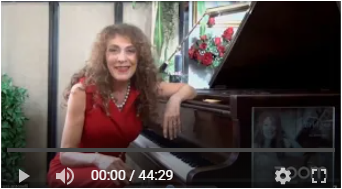 I presented the Bridges CD with great emotion, I was moved by every word I said, but most of all it moved me to know that we were all together, unified from Argentina, my country, Europe, Asia, Africa, at the same time and with a single objective, share light, love and solidarity through music.
I presented the Bridges CD with great emotion, I was moved by every word I said, but most of all it moved me to know that we were all together, unified from Argentina, my country, Europe, Asia, Africa, at the same time and with a single objective, share light, love and solidarity through music.
Bridges’ original idea was when I discovered the connection of five composers through five generations in teacher-student relationship, was the unification and elevation of Latin American countries and the connection with Europe through Frédéric Chopin and Georges Mathias.
When the pandemic started, I was thinking: did I have a premonition? I remember when I was recording it my friends told me: why do you want to finish it so soon? What’s your rush? And I told them: I don’t know, I have to hurry, I follow my intuitions …
I feel that now Bridges, with its musical bridges, has an immense meaning. Its message of building bridges that unite us throughout the world, is the solution for solidarity and unity. We are all the same and we all have an important part in the universe
JCT: Do you think it is possible to solve the problem of the distances that must be maintained between musicians and other artists, as well as with the public to avoid contagion?
RA: Honestly, it hurts me a lot to say it, but I don’t think it will be short term. It is very difficult to control the distances between people in small or large places. There is always someone who is not responsible, and is a danger. But, I think that if they manage to have a lot of staff who control very carefully, they could continue with concerts in small rooms, where the number of people could be counted and they could be seen to be separated and with masks. This I think is possible.
CT: What is said over there about the possibility of resuming activities in theaters and concert halls in the United States and specifically in New York?
RA: Well, here in New York we are very careful. This city registered at the beginning of the pandemic the largest number of deaths and sick people in the entire country.
I can tell you it was like a horror movie. People got sick and then to the hospital, and you never knew if you would see them again since no one was allowed to go in with them for obvious reasons. Every day there were 1,000 people dying. State of total panic. Praying was the only thing that could save us …
Here, nobody wants to go back to that even in our dreams. That is why I find it difficult to resume activities in theaters and concert halls. We are super cautious. The reopening phases are open, but with restrictions, and I understand that. I think until the vaccine is out, sadly, it won’t happen.
But I keep praying …
I always follow the news of what is happening in the United States, now very few states are doing well. I have seen and read this information about the Los Angeles Philharmonic, I admire Gustavo Dudamel very much and we have shared several important events here in New York. He is a musician of great talent and honesty. His decision to cancel all concerts until 2021 does not surprise me. Now in California the situation is becoming more and more serious. We will have to wait and as I told you before … pray … pray … pray …
JCT: What do people think about how to handle the pandemic, with the comings and goings, as well as marches and counter-marches of President Donald Trump, and the steadfastness of New York State Governor (Democrat) Andrew Cuomo?
RA: Actually the opinion of the people is different according to their beliefs and also in which US state they live. The country maintains great internal differences and with it comes division. In general, you could say that the country is polarized between people who defend Trump and those who do not.
For example, in New York is where Trump has the least support, they admire the work of Andrew Cuomo and thank him deeply, since if it were not for him, for his firmness and care, New York would be in chaos. We already spend too much and we don’t want more This virus does not respect which part of the country you are from or whether you believe in it or not. There it is, anyway, present, current. People here no longer want more relapse, they don’t want more comings and goings, that the seriousness of this pandemic is the same in all states.
If there were no ups and downs, this circle of insecurity and fear would be closed. It would be for the good of all and of the entire country.
JCT: If Rosa Antonelli were an actress (of theater or film) instead of a pianist, what role would you like to play and why?
RA: You know, I studied theater at the Alejandra Boero School, in Argentina, since my mother, being very young, had started acting as an actress in Italy; they say she was extraordinarily talented. I felt the need to do it. I remember when I was a child she showed me the costumes she had brought from Italy, from her performances and I tried them on with great enthusiasm, fascinated and of course … they were huge, but it didn’t matter! This is how I imagined the different characters. I began to study in her tribute, but it also fascinated me. They wanted me to dedicate myself professionally, but I always knew and never doubted my vocation for the piano. I would love to play a very romantic role. Like that of the nurse in The English Patient or Gone with the Wind or War and Peace, etc. I am an extremely romantic, passionate, idealistic person and therefore I love to fight for the causes in which I deeply believe. In Argentina we have a phrase: keeping your flags high and not bending them. I still believe deeply in keeping your word.
JCT: When did you arrive in New York? You came from Argentina, why did you leave? How did you feel then in New York, did you adapt immediately? Where is your homeland? Can you say that music is your life?
RA: I arrived in New York in 1998. I have been here for more than 20 years now. I actually made the decision for many personal and professional reasons. I returned to Argentina from a very long and important tour of many countries … twenty in total with several presentations in each of them. I had some wonderful projects because of the triumph of this tour. But reality hit me really hard. From then on, I was saddened by many personal losses, including the irreparable loss for me of my dear mother. The love for my mother is still very profound, although she is no longer with me. When I later traveled to Italy, I gave a concert at the Municipal Theater of Isernia, in honor of my mother, and all family and friends came. It was wonderful, very emotional. I felt that she was there present with all of us…. At the same time, Argentina was in a state of almost total chaos,specially in the cultural and educational areas. There were no concert possibilities or, if there were, with extreme limitations. At the National University and the Conservatory, we couldn’t tune the pianos or organize events. It was all very sad and very difficult. Things did not look like they would be better for the short or medium term; and maybe not for a very long time. You could not advance culturally.
During the tour I had had contact with Steinway and they mentioned the possibility of being a Steinway Artist. Before all of the above, personally and professionally, I needed a change. It seemed to me a message from angels, specially from my mother at that critical moment, I had to change, be strong and try, knowing that this would result in distance from my great friends who fully supported me in that decision. I decided to come here to try how I would feel. I came completely alone. I felt very alone in New York, it was very difficult for me to adapt to the language, the customs. New York is a wonderful city, with a very fast pace, very exciting and at the same time it is tremendously competitive. As soon as I arrived I already obtained a series of concerts, recordings and also a position to work as a professor at the University. The most difficult thing was when the attack on the Twin Towers occurred. It was terrifying, I was very anguished and I wanted to return to Argentina, but all my friends there and from other countries in the world helped me to remain firm and not doubt. In addition, I already had my citizenship in process, the procedures were underway, and all the agreed professional commitments were in place; I knew I had to be strong. I did so and in 2006, I was granted American citizenship as an ‘Artist of Extraordinary Ability’. My homeland is Argentina but I also feel that I belong here since they opened their arms for me to stay, as well as to Italy, for my parents, my blood and my origins. Sometimes I feel that artists belong to many places. Yes. Definitely, music is my life !!
JCT: How do you develop your performances?
RA: Well … thank you, your question is very interesting. First of all I find out all the details, the composer’s complete biography, the composer’s own style, his previous and after works to the one I am analyzing. To research his detailed history, the year in which he wrote the work, what happened in his personal life in particular at that time. Then I study and analyze the work from the morphological and harmonic point of view. In this way I discover more accurately the development of the interpretation and more adequately what the composer wanted to express or what message he wanted to deliver through his music. Also after this, not before, I listen to recordings by other pianists, if the work is not a world premiere, of course. In case it is, I try to contact the relatives and find out more details that can enlighten me for a closer interpretation of what the musician wanted. I have a very deep respect for the composers and their works.
JCT: Do you extract information about the environment of a work to interpret it?
RA: Yes. It is very important to investigate the environment. Studying and observing the historical, social and political situations and the changes that occurred in the life of the composer at the particular moment of his work are fundamental in the process of understanding it. As well as the kind of environment and family and personal life the composer was going thru so he could have left as a guide of what was his inspiration at that time, at the time of creation.
CT: Do you work intuitively? You are curious?
RA: Many times when there is not much information, I follow my intuition. She is my friend, I am generally a very intuitive person and many times I find the right decision, the right one, in that very deep voice that speaks to me and guides me. You have to know how to listen to it … I can say that in the most important decisions of my life I followed my intuition. I am very curious, I love to learn more and more, I feel that this is how I continue to grow, and that I feel alive.
CT: Are there pieces that you don’t play, because you feel like you don’t have access to them?
RA: Yes. It happens that I would love to be able to access more works by Latin American classical composers that have never been performed and elevate the composer in all the scope he deserves. It is a very long research process and, of course, in many cases it could work and in others it would be very difficult to access them.
CT: What are you working on right now and why?
RA: I’m working on the idea of recording and performing European composers with connections to Latin American composers like I did with Bridges. The reason is that in this moment in which we live, and we are physically apart, isolated in some ways, the world needs channels of union.
Music is a natural channel, of connection, that does not need to travel physically and that can transmit the emotions and feelings we share. Just as we would also feel in that way the union between the countries that they represent with a message of hope, peace, faith and the possibility of once again feeling the magic of dreaming about ourselves and at the same time of a better world.
JCT: Thank you very much for your statements, dear Rosa Antonelli.
RA: Many thanks to you for your questions so sensitive, profound, that helped me open myself as a person and an artist. For your time, your professionalism and above all, because I felt the love for what you do. Thank you!
Pianist Rosa Antonelli will host Concert at Carnegie Hall, an online watch party on Monday, August 10 @ 7:30 PM New York time, celebrating her triumphant October 2011 performance in Carnegie Hall’s Stern Auditorium, including selections from her critically acclaimed Albany Records CDs Remembranza and Esperanza. The concert was a benefit for Action Against Hunger.
Presented with the sponsorship of the Consulate General of Argentina in New York, the August 10 event can be seen at https://youtu.be/SejDjithIWM
Ms. Antonelli will perform L’Automne Waltz and Granada from Suite Española by Albeniz, the World Premieres of two works by Piazzolla, El Mundo de los dos and Imperial, Ginastera’s Tres Danzas Argentinas and a special encore.
Her latest CD Bridges, From Chopin to Piazzolla has received international acclaim. Read reviews and see video interviews with Ms. Antonelli about it at https://www.rosaantonelli.com/reviews/.
Argentinian pianist Rosa Antonelli, a Steinway Artist since 1998, is one of today’s leading performers and a champion of classical Latin-American and Spanish music.
She has toured extensively, with more than 1,000 concerts in Europe, Africa, Asia, Latin America and North America, and is dedicated to performing and recording the works of that include Argentinian composers Piazzolla, Ugarte, Gianneo and Guastavino, as well as Albeniz, Granados, Villa -Lobos, Ponce and many others from Spain and Latin America, and bringing them to audiences all over the world.
For more information about Ms. Antonelli, including a bio, photos, discography and much more, please visit https://www.rosaantonelli.com/
Rosa Antonelli: “Ginastera and Piazzolla: a Transcendental Historical-Musical Link
By Sergio Levinsky June 17, 2020
The famous Argentine pianist, who has lived in New York for more than 20 years, spoke with Infobae Cultura about her journey from a child prodigy to Carnegie Hall, her incredible anecdotes from around the world and the latest news about her new album, Bridges, which she presented a streaming live online on June 25, and many other topics.
Rosa Antonelli is a world renowned Argentine pianist. She moved to New York City more than two decades ago, where she has resided ever since. Thanks to the talent of her graceful fingers, Ms. Antonelli has traveled the world uninterrupted to such an extent that it’s very difficult to the country she loves to perform in front of an audience she misses.
At the age of 3, she learned that her true calling was the piano. At 13 Rosa entered the Conservatorio Superior Nacional de Música, where she received a degree as Professor, with honors, in only 3 years instead of the 9 years that is usually required. After this, she was given many honors with scholarships that led her to Brazil, Spain, and finally, the United States.
In this dialogue with Infobae Cultura, she discusses the long, eventful journey that took her from being considered a child prodigy to her performances at the legendary Carnegie Hall, with some vivid stories that seem to come from a work of fiction: the time when she was kidnapped for being considered a spy, a train trip through Eastern Europe as the Berlin Wall fell or even the emotional concert she gave in Tel Aviv while besieged by bombings.
Also, she describes what Bridges, her new CD, is about as she musically connects Chopin with Piazzolla. Rosa will present the music of this album at a live concert on YouTube on June 25, which she hopes will be a way to reconnect with the public in her home country of Argentina.
About her latest album
– What is Bridges? How could you synthesize which one was the idea of this CD, and why did you think about it in this way?
– We thought a lot about the title of the CD. We needed a word or a sentence that could represent and describe the historical link between these composers. Bridges, as we know, whether physical or metaphorical, mean a connection. The bridges invoked on this disc represent a series of personal and musical connections between five composers through five generations, beginning with the romantic composer, Chopin, in the 19th century, and ending with the revolutionary master of the new tango Astor Piazzolla in the 20th century. They have a link and direct relation of teachers to students: Chopin, Mathías, Williams, Ginastera, and Piazzolla. The origin of the concept for this CD started at the end of one of my concerts at Carnegie Hall’s Stern Auditorium, where I played a Chopin Nocturne as an encore after I performed a complete program of Spanish and Latin American classical music. Many people in the audience, including the president of Albany Records, said afterward that they felt a certain musical similarity between the music of Chopin and Piazzolla. I confess that I felt the same. This made me return enthusiastically to musical history. Lastly, I would like to add that the five composers on this CD were, literally and musically, immigrants who traveled following their dreams of enriching themselves and achieving their dreams and goals. The repertoire shows the free exchange of ideas that comes from travel and immigration.
– If you had to summarize the evolution or of the CD, what would you say? –
The program on this CD begins in 19th– century France with romantic works by Chopin and his student Georges Mathías and concludes with works by the great Argentine composer of the 20th century, Alberto Ginastera, and his student Piazzolla. The center of this arch is Alberto Williams, one of the founders of Argentine classical music who traveled to Paris to study with Mathías. The first piece on Bridges is the same Nocturno in C # Minor, No.20, Op. Posth. by Chopin that I performed that night at Carnegie Hall and which at the same time represents my own musical, historical, and emotional bridge. When I was very young, my mother gave me a record called Rarezas de Chopin, by Arnold Pomerantz, and I fell in love with this particular work. I listened to it many times. Back then, it took years to get the score. I finally got it in Poland, where I later played it at the Ostrogski Palace-Warsaw Chopin Society and at the best centers and theaters dedicated to honoring his music. Every time I play this piece, I dedicate it to my mother, who was my first bridge of inspiration and the inspiration for this CD.
– Why Chopin and why Piazzolla? What is the bridge that connects them? –
As you may have already noticed, Chopin was my favorite composer from my earliest years. I have deeply studied everything about him, his life, his customs, of course, his music, social history, etc. He is considered one of the most influential composers in history and one of the greatest representatives of musical romanticism through his stylistic, lyrical, subtle, poetic refinement and his harmonious elaboration of ideas. His influence, through five generations of teachers to students, reaches Piazzolla, one of the most important composers of the 20th century. After Piazzolla, there is no other significant student. The bridge that unites them is the evolution of romanticism clearly manifested in a profound sense, of completing the circle: Piazzolla’s works on this CD, such as Oblivion and Zamba-Canción are as romantic in concept as Chopin’s nocturnes.
About Ginastera, Piazzolla and Latin American music.
– You play Ginastera a lot. Why? Is there a revival of folk roots on your CD? Or perhaps because Ginastera lived in New York, like you in these years?
-My musical history with Ginastera began many years ago. He was the first Argentine composer who I learned when I was a child, and I was very impressed with his compositions. I deeply admire the architecture that he created in his music, honoring the folklore of our country, but also of all Latin America. Definitely, I can say yes, there is a very deep revival of the folk roots of our country. Ginastera lived and won many awards in New York, and also it was here, where he began his international career. I can say that we have the same musical curiosity, since I also came to live in New York! The story continues as I personally met the composer’s daughter Georgina here. She listened to me at several concerts and after one of them at Carnegie Hall in late 2014, we decided to celebrate with a tribute concert for the centenary of her father’s birth at the Auditorium of the Argentine Consulate in New York in May 2016.
That night we had great and famous personalities in the audience from the music world, media, and culture. I can say that it was a deeply meaningful and unforgettable night and a great honor for me.
– There is also a link between Ginastera and Piazzolla, right?
– Yes, certainly. Ginastera and Piazzolla build the last bridge on this CD. Ginastera was the teacher of Piazzolla for many years when they were very young, and Piazzolla wanted to compose symphonies and other forms of the classical genre. As we know, he won many awards for his classical compositions. He always came to Ginastera’s house for his lessons with his bandoneon in its case and left it near the work table. Ginastera was the first teacher who observed and felt what Piazzolla really dreamed of composing and said to him: “If you like the tango, write a new tango.!” I can say that their relationship establishes a transcendental and historical-musical link.
– Why is Piazzolla’s classical music not known as much as his tangos?
– It is a very interesting question. Tango was born in Buenos Aires, and as we know, it originated with the immigrants who gathered in the cafes to share their feelings of nostalgia and melancholy and also feelings of hope for a new beginning. Piazzolla’s parents were also immigrants from Italy, like mine. Therefore, the tango has strong and profound historical and emotional roots in Buenos Aires. Piazzolla loved the tango, and that’s why he wrote a new tango style using classical harmonies. He also changed the structure of the sound and incorporated jazz counterpoint and harmonies.
I have read a lot about him, as well as learned a lot when I saw the film Historia del Tango. Because of this for the first time I began to understand and admire him and to play his music, which was rejected at the beginning in Buenos Aires, but idolized in the United States and Europe. I remember very vividly what he wrote in his Memoirs, and that answers your question, he said: “In the world, they come to listen to me for the music I compose which relates to the tango … and they also know that I am going to play music which is from Argentina and I am very proud of it. I have been a very controversial artist in my country and, on the contrary, highly acclaimed abroad, where nobody thought of whether my music was a tango or not.”
His dream was to transfer the tango from the dance stages and take it to the great concert halls of the world, and he conquered it since many famous musicians like Yo-Yo Ma or Martha Argerich perform his music in the most prestigious theatres.
– In other CDs of yours, like Esperanza, Remembranza and Abrazando, there are more Latin American composers than in Bridges. Why?
– It happened that in 2009, Albany Records asked me to record a CD with different classical music from the traditional repertoire, and that is how Esperanza was launched, with Spanish and Latin American classical composers. It was so successful that later Albany released Remembranza and then Abrazando.
I performed the music of these 3 CDS at Carnegie Hall in a sold out concert.
The composers in these CDs represent the unification and elevation of the image of music from Latin American countries. Bridges is an evolution of this concept, since across bridges Europe is joining Latin America with Chopin and Mathias. Therefore, the message in the album Bridges is an idea of unification of the world. I would like to continue contributing, even minimally, with my music, to this ideal of love, integration, and communication in the world.
Your moment as an artist
– At what point in your artistic career is this CD? Are you thinking about the next one, or do you already have it?
– This CD finds me at a very special moment in my career. I feel that I am in a special stage of my maturity, where I have a great and deep communication with the audience. When I’m onstage, I feel like we’re breathing together. I don’t feel so nervous before the concerts anymore. I look forward to it as the feeling of giving completes me, and at the same time, I receive so much from the audience! It is a moment of great happiness for me.
With the record label I work with, we had several musical projects planned after Bridges. But the Pandemic in the world, the pain, and the inherent losses have touched me deeply as a person and as an artist. Because of this, I am leaning towards recording works of the same genre, but more emphasis on the connection of all the continents in the world. We cannot travel, but music has taught us through history that we can unite, if there are no borders or limits, through its inspiration.
– What are your next steps as an artist?
– Definitely shocked by the current situation. All my concerts were canceled, but I will continue with virtual concerts from my home. I have planned a streaming concert on YouTube next June 25 at 8:30 pm, performing the music of Bridges. I thank the technology like never before for allowing everyone to be in contact, united from “our home.” For this, I will have the collaboration of the Argentine Consulate in New York. I am thinking of some form of charity to help the neediest countries, and that is why I am already in contact with various organizations around the world. When everything returns to normal, all my concerts will be rescheduled, and I will continue with my recordings.
As a child prodigy To Carnegie Hall
– You are a very recognized artist in the United States. You are a Steinway artist; you played at Carnegie Hall, you have many high level awards. I imagine it was a long way. How long have you lived in New York, and how was this journey?
– Yes, definitely, it was a very long and uninterrupted path. I work constantly, and this is one of the reasons that I haven’t been able to go to Buenos Aires for a long time. I came to the U.S. in 1998 when I became a Steinway Artist. It was very hard to adapt to the customs and the language and also because I came completely alone. New York has a very fast, exciting, and at the same time, very competitive rhythm. Many people from all over the world come here to try and succeed. When the attack on the Twin Towers occurred, it was very distressing. I had tremendous anxiety and wanted to return to Argentina, but I already had my position here at Adelphi University and my schedule for concerts and recordings. I knew I had to push myself to try hard and wait. In 2006 I was granted U.S. citizenship as an “Extraordinary Artist”.
– Why did you leave Argentina? Did you think you had reached the ceiling of your possibilities?
– Actually, it was a combination of personal situations, with many emotional losses, especially the death of my dear mother, and of course, professionals reasons as well. And yes, artistically, I thought that I reached the ceiling of my possibilities, added to the fact that the country was stagnant and with no aim of progressing culturally in the short term. There was extreme limitations and stagnation of all kinds in the cultural and educational fields. It was very depressing and sad. There was no way out.
– If you had to define yourself as a pianist, how would you do it?
– First of all, I am a classical pianist, with a romantic inclination, and with a great passion for rescuing the “lost” or underperformed works of Latin American classical composers.
– When you played at St. John’s University, something extraordinary happened, please tell us.
– Yes, it was something unforgettable and inspiring. The New York City government gave me a proclamation, in person, and they began reading it. The first thing they said was: “Today, in New York City, on April 23, 2014, we proclaimed Rosa Antonelli Day for …” and they read the details point by point. I remember very well that they expressed admiration and gratitude for inspiring them for my international work in the promotion of Spanish and Latin American classical music, my numerous benefit concerts, my teaching work, my book, etc. Tears were falling on my face. And I was very embarrassed because I could not hide it, I did not expect such high recognition. It touched my heart very deeply. This happened at the end of my concert at the St. Johns University theater. The Spanish Honor Society was celebrating its 50th anniversary and for this reason, I was invited to give a concert there and I performed some of the works that I would repeat six months later at Carnegie Hall to raise funds for scholarships for Latin American students. In addition, I received the title of Honorary Member of the Honorable Spanish Society. And the title Order of the Discoverers.
– Do you miss Argentina? What customs do you miss the most?
– Yes, I miss my dear Buenos Aires very much. I especially miss my affections, my friends, my students, “the mate” shared with a friend, the coffee, the time for friendship, the theaters, and most of all the people and the fervent and warm Argentine audience.
– Would you like to perform in Argentina, if you have a chance to do so?
– I would definitely love to meet again with the Argentine audience. The opportunity has not been presented yet. Since I arrived here since it has been a path full of uninterrupted projects. Here I work a lot researching, preparing my concerts and teaching. Surely, this virtual concert with Bridges will allow me to reconnect with my warm and unforgettable audience from my beloved Argentina.
– Did you have guides, mentors in your career? Who did you admire?
– I want to express first of all that my first guide was my mother. She always supported my vocation for the piano with love and encouragement, despite having many financial difficulties that she had to face when she arrived in Argentina. Her parents had lost all their property in Italy due to the devastation of World War II when she was very young. Then, my first piano teacher, María Luisa Carfi, who, knowing our financial limitations and knowing that I did not have an instrument to practice on, provided me with a room with a piano in the back, separate from the house, to which I had access and in which I could practice uninterruptedly. That situation lasted almost ten years. She called me “the little light in the background,” since I practiced hours, until late at night. For me, it is an example of generosity and honesty.
How was your training in Argentina before going to the United States?
– My training started very early. At the age of three and a half in kindergarten, I listened to the piano for the first time and thus began my passion for it. From the age of 4, I studied with private teachers, mostly from the Scaramuzza school until I was 13 when they recommended that I enter the National Conservatory of Music. So, I did, preparing for a placement exam and audition that was equivalent to the first six years of the Conservatory. I passed it, and in three years, being the youngest, I got my degree with honors.
As I had already started to give concerts, I decided to complete the Superior Course of the Conservatory a few years later since I liked teaching a lot.
Two years later, I obtained a scholarship to study for a semester at the Pro Arte University in Rio de Janeiro with Daisy De Luca, a disciple of Magda Tagliaferro. At the end of the seminar, I won the first prize in the competition for the best piano performance. The following year I won that scholarship and award for the second time. After that I was awarded a scholarship by the Government of Spain to study at the University of Santiago de Compostela, with teachers Manuel Carra and Alicia de Larrocha. There I won the Rosa Sabater price for the best interpretation of Spanish music. A few years later, I won another scholarship to participate in the Aspen Colorado Music Festival in the U.S.A. Later I took different seminars with other remarkable teachers. And later, for two consecutive years, I won a scholarship in Argentina to study with the teacher Alfonso Montesinos, a disciple of Claudio Arrau.
At the same time, I had private lessons with the teacher Roberto Caamano in Buenos Aires. Also, in Europe with Rafael Puyana, Rosalyn Tureck, Franco Medori, Edith Fisher, and other notable teachers. I performed on numerous and extensive tours in Europe, Asia, Africa, North America, Central, and South America. I also gave seminars on technique and interpretation. I studied philosophy and art history at the National University of Buenos Aires because I wanted to understand what happened in the minds of genius composers in order to create such great compositions.
Amazing stories around the world
– You’ve traveled the world, so you will have a thousand anecdotes to tell.
– So many. In 1990, I had a five-month tour scheduled, starting in Russia and ending in Switzerland in January, I performed in twenty countries, forty-three concerts! When I got to Moscow, I was assigned an assistant, obviously because of the language and so on.
I arrived at the airport in the afternoon, and then later I went to have dinner at the hotel, one of the best hotels in Moscow. It struck me that the food portions were very small. I was hungry!
The next day the same thing happened with breakfast. The assistant came looking for me to take me to the theater to try the piano; the concert was that night. When we arrived, after practicing, I said with some embarrassment, “I am hungry, and I feel weak. Can you take me out to eat somewhere?” “There is not!” she told me, “all trucks with food are stopped before reaching Moscow, and they throw it away. I have food in my house – we are going to look for it”. When we arrived, she opened the refrigerator, and to my great surprise, she took out the only visible thing: a sandwich, she broke it into three portions and gave me one part. The rest was for dinner, for her and her sister, she told me.
That night, for the concert, I ordered a tea, to relieve the sounds of my hungry stomach. When I went out on stage and saw the entire room, everything was forgotten. It was one of the most unforgettable concerts of my life. And among the public, a journalist from one of the most important newspapers, Clarin in Argentina, called Buenos Aires to tell about my success.
Another anecdote occurred in November 1989, after my presentations in Belgium, the Netherlands, and Germany When I was on the train on my way to Poland, I saw from the window people carrying mattresses on their shoulders and throwing stones and running. I knew right away, when I arrived in Warsaw, that the fall of the Berlin Wall had occurred. But I also had very rough moments.
– What happened to you?
– On another of my long tours, after passing security at the airport, knowing that my plane to Italy was leaving in 20 minutes, they asked me: “Why were you in so many countries? Why so many cities?” I explained to them that I am a pianist. I opened my suitcase and showed the programs, the posters. I saw my plane leaving while my passport was taken and with a woman carrying a rifle, they took me to another plane without knowing where I was going. When it landed, I with handcuffs, and without knowing where I was, was taken to a building, where they put me in a room with a woman from France. The two of us were crying. After 28 hours, the woman with the rifle says: “Mrs. Antonelli, sorry for the mistake. We found out during these 28 hours and confirmed that you are not a spy and yes, you are a pianist”. I no longer understood this horror story, crying for 28 hours and thinking that I was going to disappear as it happened with other people in the past. They put me on a plane to Italy, the one I was supposed to take originally. When I got there, I knew that all the audience had been waiting in the theater and I never appeared! Gently, the theater authorities, in shock with what happened, organized a private concert a few days later to make us all feel better. As artists, we often have to think that we are ambassadors of music, of composers, transcending the barriers of fear with courage. And it wasn’t the only time something like this happened to me.
– What else happened to you?
– In 1990, on another of my extensive tours, my manager warned me that the Gulf War would probably start. I should be especially careful because I had to play at the Cairo Opera Theater, being the first pianist who would perform there after its reconstruction. That concert was going to be broadcast to all over the world. Continuing the tour, the war was already starting, and after Cairo, I had to play in Tel Aviv. At that point, they asked me to cancel that concert and other concerts because the bombs were falling. I thought, at this point, that I had to choose, and I said to myself: “If I have to die, I prefer that it happens on stage, giving something good from me, even if it is to one person, rather than dying at the hotel, in the street, or on the plane.” I took the plane, and when I arrived in Tel Aviv, I was greeted at the airport with a box containing all the elements to defend myself against attacks. When I was already at the hotel, they called from the Argentine Embassy to advise me to cancel the concert scheduled for the next day. I deeply thanked them and expressed my feelings to them. The next day, the day of the concert, I went to have breakfast, and there was nobody in the restaurant. I asked the concierge why and he said, “You are the only person in the hotel. Everyone canceled, including all the artists.” That night when I was in the room, getting ready to get dressed and go to the concert hall, I heard the noise of the bombs, and I thought “it’s better I am dressed as I am, no long dress this time!” The car picked me up and we had to stop several times because of the bombs. Finally, we arrived to the hall, and the Argentine ambassador and his wife were there. What a happiness and honor! I went on stage, and to my great surprise, the room was half full. When the concert ended, we all cried. Of course, instead of going to the room behind the stage, I went out to meet the audience where we all hugged each other emotionally, in tears. There, I found out that they were all artists from different disciplines, thanking me deeply for my concert. When I returned to Argentina two months later, I started receiving letters, and they were from the people of the Tel Aviv audience, thanking me again for the courage and for the beautiful moment that made them forget about death and fear. I cried ……, and I also thanked God for the opportunity to give.
– You never thought about writing a book telling your life, with so many things you lived?
– Many times they offered it to me, but it is so much work that I still haven’t accepted it, but I think I’m ready now.


